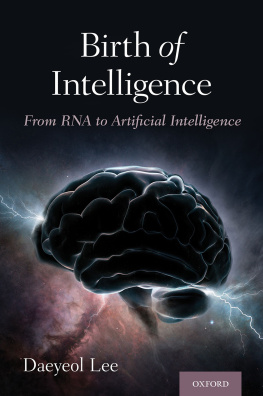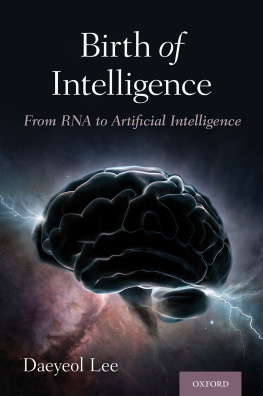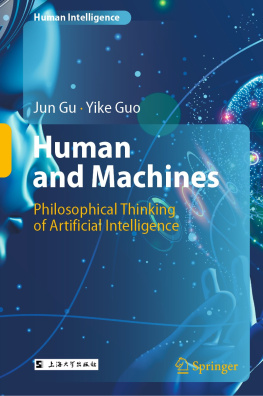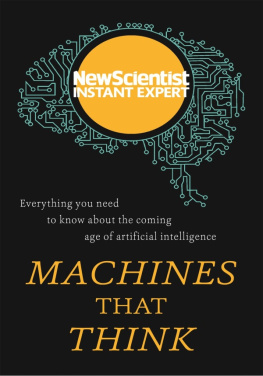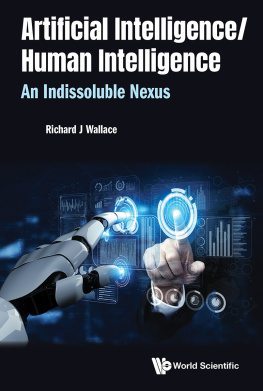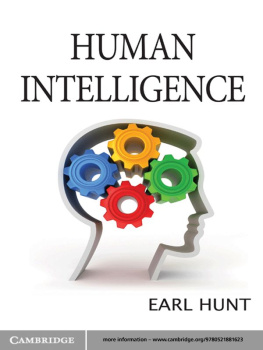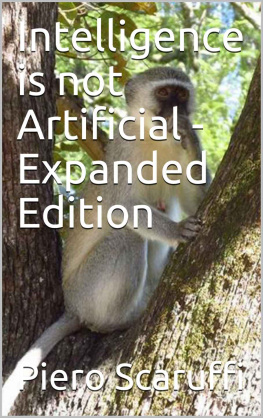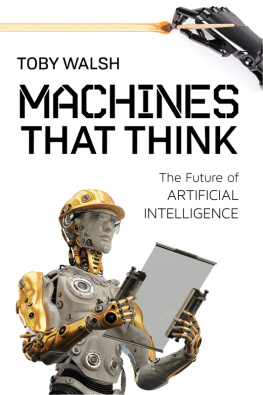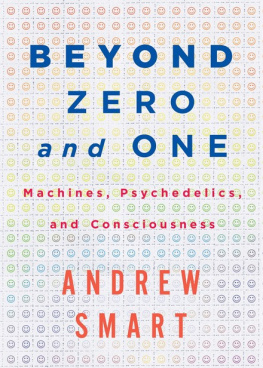Birth of Intelligence

Oxford University Press is a department of the University of Oxford. It furthers the Universitys objective of excellence in research, scholarship, and education by publishing worldwide. Oxford is a registered trade mark of Oxford University Press in the UK and certain other countries.
Published in the United States of America by Oxford University Press
198 Madison Avenue, New York, NY 10016, United States of America.
Oxford University Press 2020
All rights reserved. No part of this publication may be reproduced, stored in a retrieval system, or transmitted, in any form or by any means, without the prior permission in writing of Oxford University Press, or as expressly permitted by law, by license, or under terms agreed with the appropriate reproduction rights organization. Inquiries concerning reproduction outside the scope of the above should be sent to the Rights Department, Oxford University Press, at the address above.
You must not circulate this work in any other form and you must impose this same condition on any acquirer.
Library of Congress Cataloging-in-Publication Data
Names: Lee, Daeyeol, author.
Title: Birth of intelligence : From RNA to Artificial Intelligence / by Daeyeol Lee.
Description: New York, NY : Oxford University Press, [2020] | Includes
bibliographical references and index.
Identifiers: LCCN 2019041118 (print) | LCCN 2019041119 (ebook) |
ISBN 9780190908324 (hardback) | ISBN 9780190908348 (epub)
Subjects: LCSH: Intellect. | Brain. | Artificial intelligence.
Classification: LCC BF431 .L43245 2020 (print) | LCC BF431 (ebook) |
DDC 153.9dc23
LC record available at https://lccn.loc.gov/2019041118
LC ebook record available at https://lccn.loc.gov/2019041119
For Wangbal and Doolie, two intelligent beings
Contents
We are different from inanimate objects, such as rocks and raindrops, or countless life forms ranging from single-cell organisms to other mammals. Are we humans special and fundamentally different from other animals? If so, how did we come to acquire such a status? What features distinguish humans from other animals? What makes humans human? These questions are not new, and since antiquity, many scholars and philosophers have sought to answer them. Perhaps what really distinguishes us from other animals is that we are curious about the origins of our species and the universe and just about everything in our surroundings. What really separates us from other animals is our intelligence. This book explores how that happens.
To explore the origin and limits of human intelligence, we should begin by coming up with a working definition of intelligence. Although many definitions have been proposed, there is still a consensus that intelligence refers to the ability to accomplish a goal in diverse environments. Intelligence is not unique to humans, because all animals have certain abilities to select their actions appropriate to maximize the likelihood of their survival and reproduction in their environments. Nevertheless, compared to other forms of intelligence on Earth, human intelligence has produced more impressive outcomes. For example, only humans have built a spaceship to take them outside the Earths atmosphere and bring them back safely. Even more amazing is that various technologies are advancing at an accelerating rate. This is probably best illustrated by the technology for digital computers. Only half a century ago, the first computer with the integrated circuit technology was used for flight guidance in the Apollo spacecraft for its journey to the moon. Nowadays, more than 2 billion people in the world carry digital computers hundred thousand times more powerful in their pockets.
Human intelligence has been applied to a vast range of problems, ranging from foraging for food and water to the problems in physics and mathematics. In fact, humans are curious about everything they encounter, including their own intelligence. This book will discuss what role curiosity plays in the intelligence of humans and other animals. In addition, understanding the origin and limitations of our intelligence has practical benefits. Our intelligence is needed to solve all kinds of problems we face in our society. Therefore, it is critical for us to be aware of potential weaknesses and biases in our intelligence. This metaknowledge is necessary for peaceful resolution of various conflicts within our society, by preventing excessive self-confidence and making us more receptive to the opinions of others.
Human intelligence has many strengths but also has limitations. Many problems in our society, ranging from pollution to traffic accidents, are the consequence of technologies that we developed to solve other, often simpler and more basic, problems. Eventually, more advanced technologies might find solutions to most problems related to the basic material needs for humans. However, advanced technology will also create new sociopolitical problems, which might be the most challenging problems that human intelligence will face. For example, material benefits resulting from new technology will not be distributed immediately and evenly to all the members of our society. It is difficult to make everyone agree about how these material benefits should be distributed, which is often the cause of constant political debate. To resolve these conflicts peacefully, it will be helpful to understand how our intelligence might misguide and prevent us from finding a good compromise. Social conflicts might arise either because people have different motives or because they share a common goal but disagree about what might be the best approach to achieve it. Intelligence plays a key role in both cases. If people have different goals, intelligence will be needed to allow them to find a good compromise. If they have the same goal but still disagree on what might be the best common strategy for them, a close examination of their intelligence and its limitations might be particularly helpful for discovering errors in their reasoning. When we are not aware of the bias in our intelligence, we might be making things worse even with good intentions.
If we have a solid and scientific understanding of our intelligence, this will also prepare us better to deal with societal problems resulting from the rapid development of artificial intelligence (AI). In particular, many authors and scholars have speculated as to whether and when AI will surpass human intelligence. Answers to these questions are possible only when we have good understanding of both AI and human intelligence. This book will demonstrate that intelligence is inseparably intertwined with the history of life. Biological intelligence originated and evolved to enable its owners to survive and reproduce. Even the most primitive life forms can adapt to their environments to some degree, and therefore possess some problem-solving skills. By contrast, the history of AI has taken a very different route. AI is less than 100 years old, but AI and computer industry have been completely transformed during this period, while human intelligence has hardly changed. Especially during the last 10 years, the progress of AI has been startling. AI is now coming up with solutions for many practical problems that used to require extensive human interventions. Increasingly more often, it exceeds the performance of human experts in unexpected domains, such as medical diagnosis and playing complex board games, such as Go, even though until recently many had predicted that human superiority in those domains would continue much longer.

